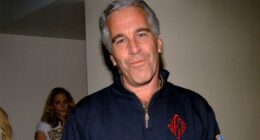Share this @internewscast.com
For quite some time now, Americans have expressed their frustration with cancel culture—the relentless cycle of public outrage, shaming, and the all-too-familiar Notes app apologies.
It appears that Hollywood is finally taking note of this sentiment.
Controversies that previously prompted urgent PR efforts, social media deletions, and late-night statements are now encountering a different response: silence.
From Kristen Bell’s firm stance amidst a social media backlash last month to Taylor Swift’s subtle defiance through her music, celebrities are reshaping the landscape of crisis management. Industry insiders suggest that the era of automatic apologies may be drawing to a close.
When Bell shared an anniversary message dedicated to her husband, Dax Shepard, last month, she likely anticipated an outpouring of heart emojis.
However, the actress faced criticism for insensitivity after an inside joke about men murdering their wives coincided with Domestic Violence Awareness Month.
Critics called the joke ‘tone-deaf.’ Hashtags calling for accountability trended. And Bell? She said nothing.
She didn’t delete the post or issue a statement. Within days, the uproar vanished, drowned out by the next trending topic.

For years, Americans have been fed up with cancel culture — the endless cycle of outrage, public shaming and neatly packaged Notes app apologies (Sydney Sweeney pictured)
‘Kristen Bell didn’t owe the public an emotional reckoning because her “offense” was more about audience projection than actual harm,’ Sarah Ekenberg, a communications veteran, told The Daily Mail.
‘These moments tend to flare fast and fade faster, and by not feeding the outrage, she let the news cycle move on naturally.’
Ekenberg says this marks a major cultural reset: ‘We’ve entered an era where the public is exhausted by performative apologies. When a celebrity issues a Notes app statement or teary video within 24 hours, it often feels like crisis choreography rather than genuine reflection. Silence, by contrast, can signal confidence and perspective.’
Even Taylor Swift has been staying quiet when the internet demands her commentary.
Swift, whose fanbase is predominantly liberal and female, has faced backlash for cozying up to Brittany and Patrick Mahomes, who’ve hinted at support for President Donald Trump.
Her engagement to Travis Kelce, a wholesome Midwestern NFL star, only added to the narrative that she’d gone ‘MAGA-coded.’
But instead of issuing a clarifying post or interview, Swift did what she always does and turned her thoughts into art.
On her latest album, she sings in her track, CANCELLED!: ‘Good thing I like my friends cancelled / I like ’em cloaked in Gucci and in scandal.’

Kristen Bell’s refusal to back down after a social-media storm, last month, may be proof that the age of the automatic apology may be over; seen in October 2025

Bell recently found herself accused of insensitivity after an inside joke about men murdering their wives coincided with Domestic Violence Awareness Month
Later, she teases: ‘Welcome to my underworld / Where it gets quite dark / At least you know exactly who your friends are.’
And then the dagger: ‘Everyone’s got bodies in the attic / Or took somebody’s man.’
The message is unmistakable: she’s done saying sorry.
‘Taylor is one of the most empathetic and self-aware artists of our time,’ says Grayce McCormick, founder of Lightfinder PR. ‘Her lyric, “Sad as it seems, apathy is hot,” feels like an observation of society’s growing emotional detachment, not an endorsement of it. I actually applaud her for holding up that mirror, because apathy isn’t hot; it’s hollow. It reflects a culture that’s mistaken numbness for strength and compassion for weakness.’
She continued: ‘She’s recognized the shift in power dynamics,’ she says. ‘When your fan base is loyal enough, silence doesn’t cost you – it can reinforce your control. The apology, once a reflex, has become a deliberate choice.’
This new approach has become increasingly common across entertainment, as publicists and crisis-management experts grow skeptical of the traditional ‘apologize fast’ model.
‘Silence is power,’ says Karla Cobreiro, a PR and communications executive with over a decade of experience managing celebrity and brand crises.
‘Responding to issues or backlash from your platform often lends them the very validity and attention critics are seeking. Not responding can actually minimize the problem.’
She points to how short modern outrage cycles have become.
‘Remember the Astroworld tragedy?’ she says. ‘It felt massive for a moment, went more than viral, then disappeared within days. Travis Scott’s brand and career took a hit after the Astroworld tragedy (including the cancellation of his Coachella headline slot and a temporary halt to brand partnerships). And yet, he’s in the middle of a world tour right this second.’
Cobreiro says the digital environment rewards patience over panic as ‘we live in a hyper-fast media environment.’

Even Taylor Swift has been staying quiet when the internet desperately demands her commentary; seen in 2024
Baruch Labunski, founder of Rank Secure and a reputation-management specialist, agrees.
‘Silencing criticism is a method used by public figures to protect their brands, and currently, silence is preferred,’ he explains.
‘When public contrition needs to be genuine, otherwise, the public will “rate” any hypothetical false contrition,’ he explains.
But Labunski cautions that silence only works when the controversy lacks moral weight.
‘Stars like Kristen Bell or Sydney Sweeney work with a silence PR strategy because the perceived issues had no ethical dimension,’ he says. ‘Silence will not work, however, when the issue is one of integrity, ethics, or social responsibility.’
He describes it as a ‘corrective approach’ to brand management -one that ‘projects autonomy and control over the public conversation.’
Still, he warns that ‘exposed negligence loses accounts.’
The balance between autonomy and accountability, he says, defines reputation in the post-cancel-culture era: ‘The absence of a response can be a response – but when the public senses avoidance, the silence itself becomes the scandal.’
Experts agree that the strategy can easily backfire.
‘Silence works when the controversy is fleeting, personal, or born of internet nitpicking, something that will vanish as soon as the next scandal drops,’ says McCormick. ‘But when silence meets issues of representation, equality, or justice, it almost always backfires.’

Swift, whose fanbase is predominantly liberal and female, recently faced backlash for cozying up to Brittany and Patrick Mahomes, who’ve hinted at support for President Donald Trump (pictured in 2023)

Instead of issuing a clarifying post or interview, Swift did what she always does and turned her thoughts into art, raising eyebrows with her defiant track, CANCELLED!
She cites Sydney Sweeney’s backlash over her American Eagle campaign – accused of racial insensitivity – and her family’s political party photos that featured MAGA hats.
‘Ignoring cultural criticism isn’t empowerment,’ McCormick says. ‘It’s avoidance… fans might forgive a missed note, but not a missed moment to show humanity.’
Even silence, when paired with tone-deaf imagery, can look performative.
‘Doubling down can project confidence,’ McCormick continues, ‘but it also walks a fine line between brand control and arrogance. For Taylor Swift, it’s about reinforcing her sovereignty as a global brand; she doesn’t owe anyone an explanation, and her fans reward that independence.
Meanwhile, for Sweeney, it reads as defensiveness.
Across the industry, experts say audiences are experiencing apology fatigue. The formulaic cycle of outrage, apology, forgiveness and relapse has numbed public empathy.
‘What once signaled humility now often feels like a PR script,’ Ekenberg explains. ‘Combine that with social media fatigue and parasocial overexposure, and silence has become the new power move.’
McCormick describes it as algorithmic morality.
‘PR teams now have data to track sentiment in real time. If the outrage graph dips after 48 hours, they’ll often choose to let it pass,’ she says.
That cold calculus has changed the emotional landscape of celebrity culture.
‘This algorithmic approach has a human cost; it’s made compassion transactional,’ she says. ‘Every post is a calculation, and it’s important to remember the toll this takes on the individuals behind the posts.’
At its core, this evolution reflects the shifting balance of power between stars and the public.

Baruch Labunski, founder of Rank Secure and a reputation-management specialist, cautions that silence only works when the controversy lacks moral weight
‘The role of social media in shaping public perception and influencing the effectiveness of PR strategies cannot be overstated,’ McCormick notes.
That self-contained validation loop can make them seem untouchable – but also isolated.
‘To fans, silence can look like grace under pressure,’ she says. ‘To critics, it reads as detachment and privilege.’
Still, all four experts agree that not every scandal can, or should, be ignored.
Ekenberg puts it plainly: ‘That said, silence isn’t a one-size-fits-all strategy. It works when the issue is contextual, subjective, or open to interpretation. It fails when the situation is ethical, moral, or involves a breach of trust — like a CEO publicly caught in an affair with a colleague. That’s not just an image problem; it’s a workplace conduct and power-dynamics issue.’
McCormick adds that moral clarity still matters. ‘The public may no longer demand an apology, but they still expect awareness and accountability.’
Cobreiro believes this marks the next chapter in PR evolution: ‘Public memory is short, and brands (personal and product alike) have become more savvy about distinguishing genuine risk from performative outrage: keyboard warriors don’t always translate to real-world consequences.’

‘Stars like Kristen Bell or Sydney Sweeney work with a silence PR strategy because the perceived issues had no ethical dimension,’ he says. ‘Silence will not work, however, when the issue is one of integrity, ethics, or social responsibility’
McCormick calls it a pendulum swing.
‘After years of cancel culture, there’s now rebellion fatigue. The public is over moral outrage as entertainment. But that doesn’t mean accountability disappears; it means it has to evolve. The future of apology culture lies in transparency and timing, not theatrics.’
Or, as Labunski frames it: ‘The reputation of silence leaves the negative discourse to explode cryptically in public. The stars who survive are the ones who know when to let the explosion burn itself out – and when to walk into the fire.’
At the end of the day, this new wave of celebrity silence says as much about society as it does about them.
‘The public is over moral outrage as entertainment,’ McCormick concludes. ‘We’ve mistaken numbness for strength, and compassion for weakness. Apathy might look hot – but it’s hollow.’
In 2025, silence has become Hollywood’s loudest statement – not because stars have stopped caring, but because the audience has stopped listening.

















